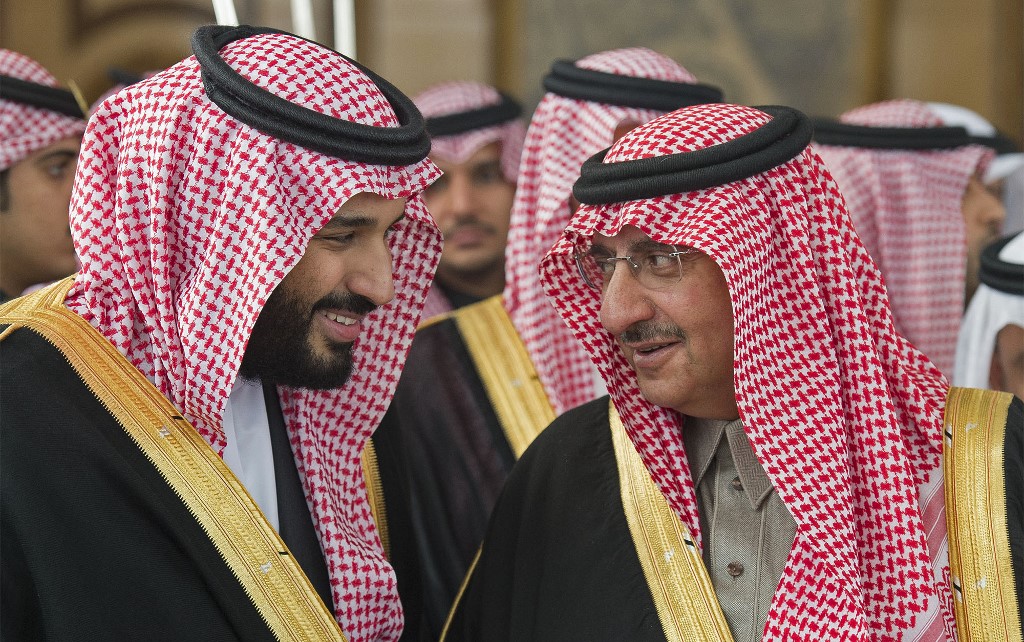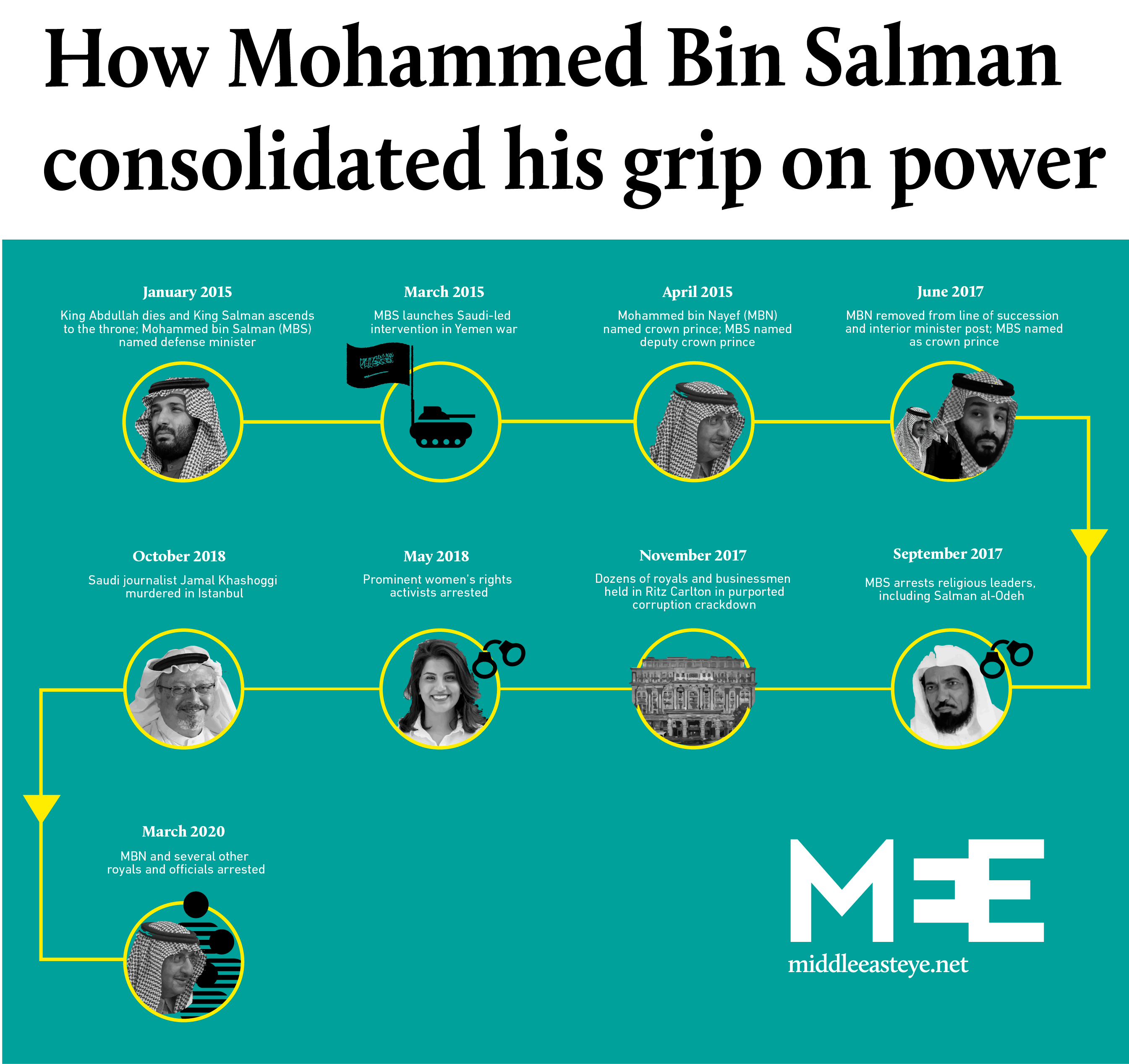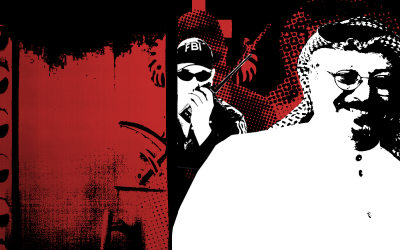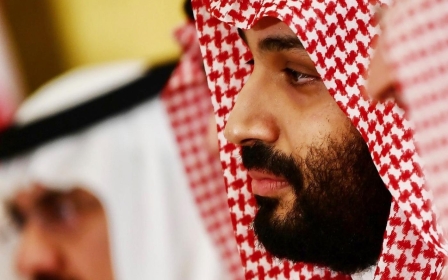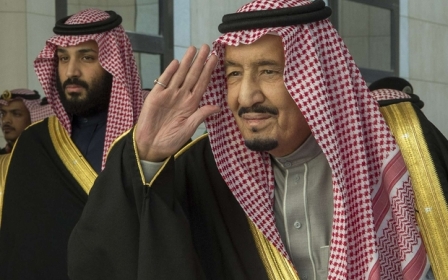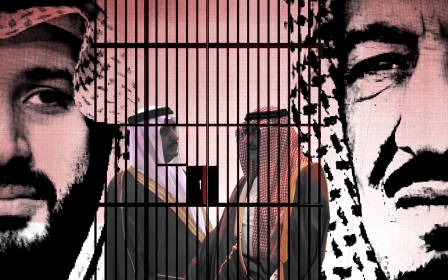EXCLUSIVE: Top Saudi intelligence official 'chased' to Canada by MBS
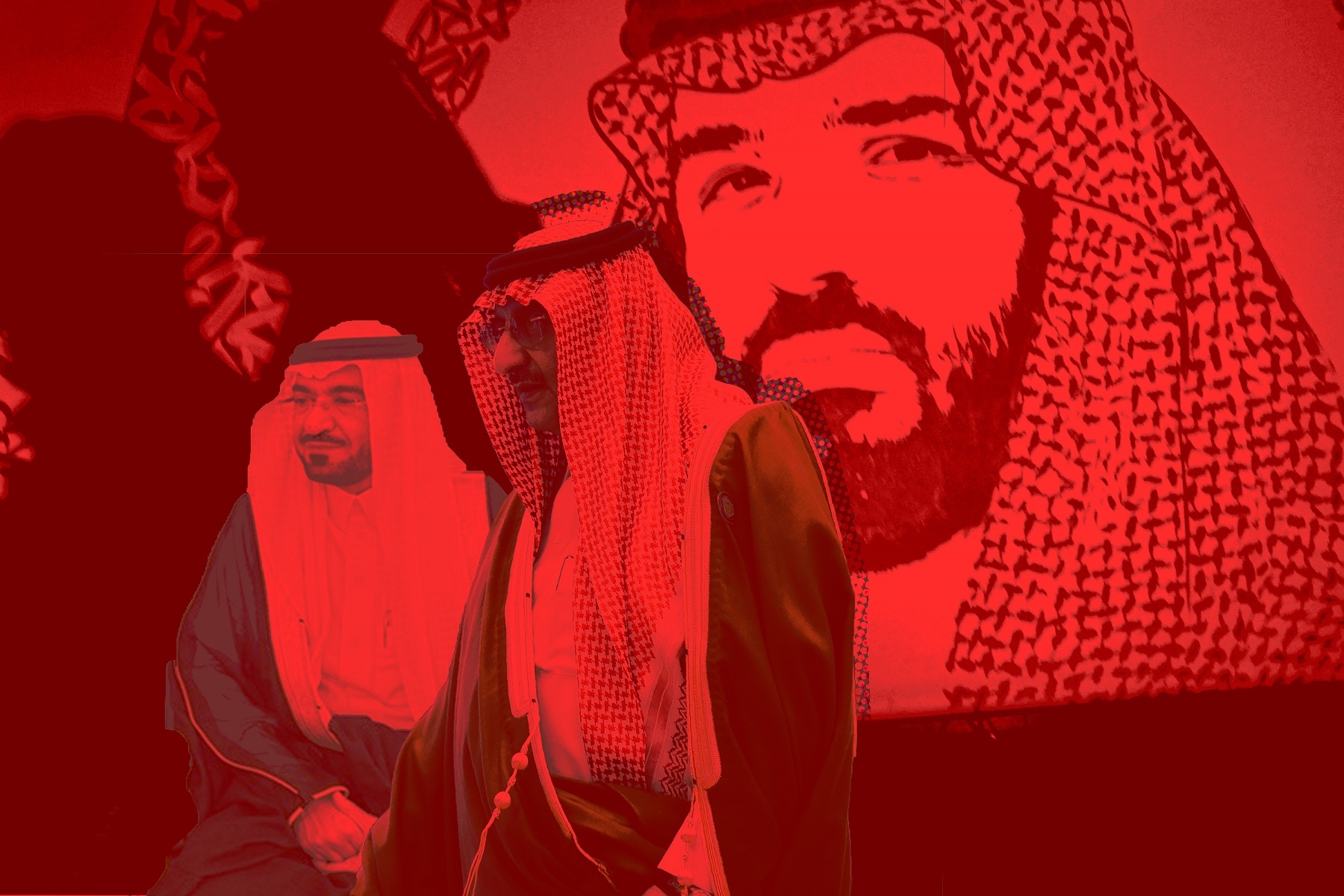
The Canadian government gave refuge to a powerful former Saudi intelligence official deemed a threat to Crown Prince Mohammed bin Salman's rule, three sources familiar with the matter have told Middle East Eye.
Saad al-Jabri, once a trusted top adviser to the crown prince's rival Mohammed bin Nayef, the former interior minister with deep ties to western intelligence agencies, is described by some observers as the most wanted Saudi outside the kingdom.
Jabri fled the kingdom in 2017 just before bin Nayef was put under house arrest and replaced as crown prince by his 31-year-old cousin.
His refuge in Canada raises new questions about an unprecedented diplomatic row between Ottawa and Riyadh in the summer of 2018.
On Friday, bin Nayef was among several royal family members and officials arrested by the crown prince in what is believed to be his latest bid to consolidate power. The Saudi government has yet to make an official statement on the arrests.
Three years earlier, it was his loyalty to bin Nayef, his decades-spanning knowledge of the inner workings of the kingdom’s powerful interior ministry and his substantial personal wealth which made Jabri a target of the young crown prince and sent him running.
“Let’s assume that there might be a coup in Saudi,” said a source familiar with the situation who spoke, as did all those briefed on the events, on condition of anonymity. “He’s the biggest threat. He would have the money and power to do something.”
A second source says even in Canada, the former official continued to be pursued, receiving intimidating messages from Mohammed bin Salman. There was also concern that there was a rendition attempt on Canadian soil to bring Jabri back to the kingdom, the source said.
MEE has been unable to independently verify this source’s account. Canadian Security Intelligence Services declined to comment.
A Royal Canadian Mounted Police (RCMP) spokesperson told MEE: “Generally, only in the event that an investigation results in the laying of criminal charges would the RCMP confirm its investigation, the nature of any charges laid and the identity of the individual(s) involved.”
MEE sought comment from Jabri and his family through several channels, but did not receive a response by the time of publication.
But sources briefed on what happened say they believe it is important that details of his ordeal come out because they further reveal the lengths to which the crown prince will go to pursue his perceived rivals.
Power struggle
During his time in the kingdom’s interior ministry, Jabri was closely involved in counterterrorism activity and served, in particular, as a conduit between bin Nayef and Saudi religious leaders.
With the beginning of Mohammed bin Salman’s rise to power in January 2015 following the death of King Abdullah and the accession of King Salman, a power struggle brewed inside the ministry between Jabri and another high-ranking ministry official, General Abdulaziz al-Huwairini, two sources told MEE.
Both Jabri and Huwairini are understood to have had close ties with US intelligence services under the leadership of bin Nayef who had established himself as a key interlocutor even before the 9/11 attacks for the Americans.
But the tensions came over their loyalties, said the sources. Jabri supported bin Nayef, who was then the crown prince, while Huwairini favoured Mohammed bin Salman, setting the stage, as the young prince grew increasingly powerful, for both Jabri and bin Nayef to eventually be pushed out.
In September 2015, Jabri reportedly met with then-CIA Director John Brennan during a trip to Washington that Mohammed bin Salman had not been made aware of. When Jabri returned home, he was fired by royal decree.
Washington Post columnist David Ignatius would later write that Jabri’s dismissal should have been an early warning sign that Mohammed bin Salman could “jump-start the kingdom - or drive it off a cliff”.
By June 2017, it was bin Nayef’s turn. That month, he was deposed, ousted from his roles as both crown prince - and heir apparent - and interior minister, and placed under house arrest in a palace.
After bin Nayef’s ordeal, Huwairini, too, was reportedly removed from his position and confined to his home briefly. US officials told the New York Times at the time that the loss of both bin Nayef and Huwarini could impair intelligence sharing with the kingdom.
But within a month, Huwairini was promoted to lead the newly created State Security Directorate which is in charge of national security and reportedly took domestic intelligence, special operation forces and counter-terrorism activities off the interior ministry’s hands.
By then, Jabri was already weeks into his escape.
Chased to Canada
After initially fleeing through Germany in the summer of 2017, Jabri travelled on to the US and is believed to have stayed in the Boston area. During this time, he wrote a blog post for Harvard University’s Belfer Center.
However, despite extensive relationships with the US intelligence community as bin Nayef’s aide, two sources informed on the matter said he did not feel safe in the US with Donald Trump in power. Instead, he went to Canada where officials secured his refuge in November 2017 and, a month later, several members of his family.
A third source with knowledge of Jabri’s situation told MEE that when he arrived in Canada, he was being chased by the Saudis who were willing to do anything to get him back.
He suggested that Jabri preferred Canada over the US not necessarily because of any specific security concerns, but because it may have been easier to bring his family to join him.
MEE asked Global Affairs Canada, Canada's foreign ministry, if the government had protected Jabri and his family and why, and whether the Saudi government had given the impression they wanted him back in any communications with Ottawa.
A spokesperson responded only: “Global Affairs Canada does not comment on bilateral communications between states.”
A spokesperson at Immigration, Refugees and Citizenship Canada said the ministry does not comment on individual cases.
MEE contacted Saudi embassies for comment but had not received a response at the time of publication.
'MBS is the camel'
Revelations of the Canadian government’s assistance to Jabri and his family will raise questions about the diplomatic row that broke out between Ottawa and Riyadh in August 2018.
Until now, the spat appeared to the wider public to have started after Canada’s embassy in Riyadh tweeted in Arabic, calling for the release of rights activists, although experts say there were frustrations already brewing in Riyadh.
'I think the reasons that MBS did what he did are clear. But was this a small irritant to that added to his frustration with Canada?'
- Thomas Juneau, University of Ottawa
Within 48 hours of the tweets, Saudi Arabia withdrew its envoy, expelled the Canadian ambassador to the kingdom and froze all new business and investment transactions, leaving seasoned observers dumbfounded.
“Routine stuff,” wrote a leading columnist in the Globe and Mail of the tweet. “But the Saudis went inexplicably berserk.”
Sources informed about Jabri’s refuge in Canada say they believe the harbouring of the former official better explains why the row escalated so quickly.
“The tweet is just the straw that broke the camel’s back and MBS is the camel,” said one of the sources.
A Canadian diplomatic source, however, cautioned against connecting Jabri’s presence in the country to the dispute which he said he believed was not related.
Thomas Juneau, an associate professor at the University of Ottawa, said he had interviewed many of the diplomats and others involved in the Saudi-Canada row and Jabri “never came up”. But he now has questions.
“I have no reason to believe that it shaped the dispute. I think the reasons that MBS did what he did [in August 2018] are clear. But was this a small irritant that added to his frustration with Canada?” he said.
"There must have been some kind of interplay between the two story lines."
Off the radar
Aside from his blog post, Jabri has been off the public radar since he left the kingdom although several Saudi and Gulf sources told MEE that they had heard that he was in Canada.
“He’s kept out of the public eye,” said a Saudi dissident, who spoke on condition of anonymity. “A few people spotted him by chance, but not because he approached opposition people.”
Bruce Riedel, a former CIA analyst and director of the Brookings Intelligence Project, said he was not surprised Jabri would have found Canada “more welcoming than the US”.
“Anyone who is a dissident is at some point at risk of being forced to come back or killed on the spot,” he said. “The Trump administration ignores the problem.”
Trump has come under fire for downplaying the role of Mohammed bin Salman in the killing of Saudi journalist Jamal Khashoggi in November 2018 even though the CIA concluded that the crown prince ordered the operation.
Saudi dissidents, both in the US and in other countries, have told MEE that Trump’s response to the killing, paired with the administration’s close ties to the kingdom, has left them anxious about their security in the US.
The FBI, as MEE first reported last year, was warning Saudi dissidents within weeks of Khashoggi’s murder that they faced potential threats to their lives from the kingdom.
And earlier this year, Abdulrahman al-Mutairi, a young Saudi living in California who has spoken out against the crown prince, told the Daily Beast and the LA Times that the FBI had thwarted an attempt by the Saudi government to kidnap him on US soil.
Saudi dissidents have told MEE that in their dealings with the FBI, the agency has sought to distance itself from the White House.
“I told them that I’m kind of afraid to deal with you guys because the current government has worked closely with [Crown Prince] Mohammed bin Salman and the Saudi government,” one who met with agents shortly after Khashoggi's murder in 2018 told MEE.
“They said, ‘Don’t worry. We are here to protect people from everywhere. It doesn’t matter who is in the White House.”
Juneau said there was no doubt in his mind that Saudis who have fled the kingdom are justified to feel concerned for their safety, but he was unconvinced their fears should be pinned specifically on Trump.
Saudi dissidents and royals were being forcibly brought back to the kingdom before 2015. Since then, it's simply a trend that has ramped up at the impetus of the crown prince.
"That Saudis wouldn't feel safe abroad, 100 percent I agree. Where I would be very sceptical is that it's because of the Trump administration. I think it's because of MBS that Saudis shouldn’t feel safe abroad."
Specifically of Jabri, Riedel said: “What he hasn’t done is say anything public." When asked how he interprets Jabri’s silence, he said, “I think he’s scared. Wouldn’t you be?”
This article is available in French on Middle East Eye French edition.
Middle East Eye propose une couverture et une analyse indépendantes et incomparables du Moyen-Orient, de l’Afrique du Nord et d’autres régions du monde. Pour en savoir plus sur la reprise de ce contenu et les frais qui s’appliquent, veuillez remplir ce formulaire [en anglais]. Pour en savoir plus sur MEE, cliquez ici [en anglais].


